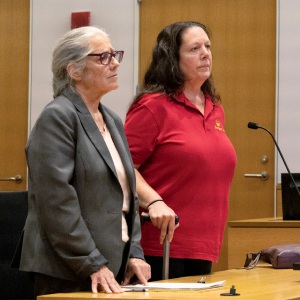Massachusetts educators grappling with suspended high school graduation requirements

AP FILE PHOTO/STEVEN SENNE AP FILE PHOTO/STEVEN SENNE
| Published: 05-29-2025 10:35 AM |
Teachers and state educators are grappling with suspended statewide high school graduation requirements and what it means for the future of Massachusetts high school diplomas.
Last November, a voter referendum eliminated the need for high schoolers to pass the state standardized test — the Massachusetts Comprehensive Assessment System — to obtain a high school diploma. Since then, state-approved high school graduation requirements have been in limbo.
The referendum was paid for and pushed by the Massachusetts Teachers Association. According to MTA President Max Page and Vice President Deb McCarthy, the test was a form of “educational malpractice” the state was engaged in for “far too long.”
“Today, high school students are taking coursework built on the highest academic standards of any state in the country, and skilled educators are evaluating whether students are meeting those standards,” they wrote in a statement. “This is a far better measure of determining a student’s readiness to graduate.”
The referendum gave the Board of Elementary and Secondary Education broad power to determine what comes next. In January, Gov. Maura Healey announced an executive order creating a “graduation council” assigned to determine new standards.
Since then, the Department of Elementary and Secondary Education has been charged with figuring out what the new statewide competency determination will be. The council is currently on a statewide tour, hearing from teachers, students, parents and other stakeholders about what should be included in a new standard.
Before November, graduation requirements in Massachusetts incorporated both a competency determination — usually measured with the MCAS — and local requirements set by school committees.
Because the test functioned as a high school exit exam, now that it’s gone state education officials are looking to find something to take its place.
Article continues after...
Yesterday's Most Read Articles
 Marine vet gets 24 months of supervised release in stolen valor case, must pay nearly $300K in restitution
Marine vet gets 24 months of supervised release in stolen valor case, must pay nearly $300K in restitution
 Cody Booska returns to competition, dominates Mass. Am qualifier with 3-under 69
Cody Booska returns to competition, dominates Mass. Am qualifier with 3-under 69
 Former South Deerfield resident sentenced to probation, must pay nearly $14K in Medicaid fraud case
Former South Deerfield resident sentenced to probation, must pay nearly $14K in Medicaid fraud case
 Real Estate Transactions: June 20, 2025
Real Estate Transactions: June 20, 2025
 Interim CEO chosen for Franklin County’s YMCA
Interim CEO chosen for Franklin County’s YMCA
 $5.74M to fund large-scale renovation at Greenfield’s Winslow Building
$5.74M to fund large-scale renovation at Greenfield’s Winslow Building
The referendum left it to school districts to decide what skills they want their students to have to graduate high school. Many districts have settled on requiring students to pass English language arts, math and sciences classes, the same standards previously tied to the MCAS. Others are adding additional courses like history or are getting specific about which courses in each subject students need to get a passing grade.
Massachusetts Business Alliance of Education President Ed Lambert said this has created problems because graduation standards in the state are no longer “uniform.” He is on the Healey-appointed graduation council.
“What the MCAS gave us was a uniform assessment so we could give parents accurate information about how [their] kid did in comparison to every other 10th grader,” he said. “It’s got to be the same assessment for all students so that we don’t fudge the system.”
According to Jack Schneider, UMass Amherst professor and director of the Center for Education Policy, the value of a state standardized test is theoretical because there is no perfect test. Schneider said the MCAS’ function as an exit exam only had value because the predominant theory was that a high school diploma isn’t a “strong enough signal” to show a graduate’s skill set and state officials believe the diploma “needs to be buffered with some other determination of fitness to graduate.”
While he believes there should be some sort of statewide standard in place, he does not believe it should be a test, because no test can think about who gets denied degrees if a student doesn’t pass.
“What we see is a disproportional denial of degrees to students of color, the English language learners, to students with disabilities, to students from low-income families, to students whose families don’t speak English,” he said. “You know that is not part of the theory, right?”
Schneider said that part of the reason why standardized testing is used to measure students is because “there is a lack of trust in teachers” when it comes to grading students fairly. Administrators know that teachers in the classroom know more about what their students know than any standardized test, but are also more likely to be sympathetic and pass a student even if they don’t meet a standard.
“I think much of that is rooted in a professional disrespect for teachers and then rooted in the well-evidenced belief that teachers want what’s best for young people and sometimes will give students the benefit of the doubt in a way that a standardized test never would,” he said.
Kristen Cote is an AP Biology teacher at a high school in Fall River. She heard that about 100 students were able to receive their diplomas retroactively since the voter referendum passed and is worried that not having clear standards will allow students who haven’t put in the work to get a diploma they haven’t earned.
“At the end of the day, teachers want to make sure that the diploma means something,” she said. “I have witnessed kids get diplomas when I know that kid didn’t pass a science class in four years.”
Under state and federal law, students will still have to take the MCAS exam, even though it is no longer needed to pass to graduate high school.
The 1993 Massachusetts Education Reform Act resulted in the development of the MCAS. The act required all students enrolled in public school to take the test from elementary school to high school and is often credited with propelling the state to being No.1 in the country in public education.
The MCAS continued to be used in the state as a tool to enforce the 2001 No Child Left Behind Act, signed by President George W. Bush. The law was aimed at improving education standards and holding schools accountable for student progress by mandating schools to require standardized testing in order to receive federal funding.
It was replaced in 2015 by the Every Student Succeeds Act, which gives schools more flexibility in education policy but still requires standardized testing. Both laws require that students be tested in reading and math once a year in grades 3 through 8 and once in high school.
The test also has served as one of the best ways to collect information about how students all over the state are doing, according to education stakeholders. Andrea Wolfe, CEO and President of MassInsight, said that the idea of having the MCAS was connected with this idea of having a clear set of standards for students to achieve to be successful in high school and beyond. She said taking the standardized test allowed educators “to be able to measure that right.”
“[The test] helps us make sure that the commonwealth as a whole is delivering on its promise to make sure that quality education is available to every student,” she said. “There is a significant value in continuing to have some type of standardized data source that can tell us how students are doing in Brockton compared to students in Boston, compared to students western Mass. and so forth.”
Wolfe said the MCAS provides a “valuable data point” because it helps educators “understand those trends over time.”
For some school districts, the MCAS is needed to prove to the state that educators are meeting the necessary standards in problem districts.
Cote’s Fall River district is in “turnaround,” meaning that the schools are the “neediest” in the state and are determined by MCAS scores in English language arts and math that have not improved substantially over time, according to the DESE website. Her school is in the bottom 6% of all schools in the state.
She said it’s hard to get students to care about taking the test — that’s being used as a “report card” for the teachers and administrations to show the state their progress — when they know it doesn’t count towards graduation.
“Our administrators are really pushing us as teachers to really push the kids and try to make sure these kids take the test seriously, which is kind of difficult when the kids know that they don’t necessarily have to pass it to graduate anymore,” she said.
However, since students can get scholarships to college from their test schools, most of them try, according to Cote.
Wolfe said no matter what happens with the new standards, the state needs to make sure it’s collected what’s needed from students to help make improvement to education.
“Moving forward, we want to make sure there’s still some type of data source that helps us understand how students across the commonwealth are doing, that we can follow trends over time for content areas, and there is opportunity in this moment in time.”
There are many opinions from educators about what should replace the MCAS as a competency determination.
Schneider said that the “complicating factor” in deciding a new competency determination is that the state does not have an agreement as to what courses should be taken for a student to earn a high school diploma.
“Removing the de facto exit exam means that I think we do need to pay a little bit more attention to the courses that are required,” he said. “That’s not as easy as it may at first appear because there are students who are enrolled in career and technical education programs.”
Lambert said that his organization backs a standard that “continues to uphold high academic expectations for all students.”
“That standard can emphasize a broader set of skills and experiences that prepare students for success,” he said. Lambert hopes more is considered in allowing for students to graduate high school, like taking a college class or getting an industry-recognized credential.
Page and McCarthy wrote that “any new graduation requirements must be expansive and take into account the diverse learning styles and abilities of all students.”
As a teacher in a school with a diverse set of students, Cote hopes that new requirements allow students to meet a new standard even if their circumstances are different.
Most of Cote’s students are living in poverty, are English language learners, or special education students. She believes there needs to be “alternative pathways” for special education students and new ELL learners because they shouldn’t have the MCAS or any other state requirement “hanging over their head for graduation requirements” if they are not prepared for it.
“I want to make sure that the students who graduate and get diplomas from our school are actually competent and proficient.”
DESE is currently aiming to have new requirements in place for the graduating class of 2027, according to their website.
“This debate comes and goes and waxes and wanes,” Schneider said. ” We’ve been doing this for 60 years now, and we are pretty resistant to learning our lesson that there is no perfect test. This is a deeper issue that requires us to think beyond the right assessment.”
Maya Mitchell writes for the Recorder from the Boston University Statehouse Program.






 Committing to ‘a more equal and just society’: Greenfield celebrates Juneteenth
Committing to ‘a more equal and just society’: Greenfield celebrates Juneteenth Labor of love: Born to Birth doula service settles in at Orange Innovation Center
Labor of love: Born to Birth doula service settles in at Orange Innovation Center Crisis negotiation team responds to Turners Falls apartment after reported domestic violence incident
Crisis negotiation team responds to Turners Falls apartment after reported domestic violence incident
